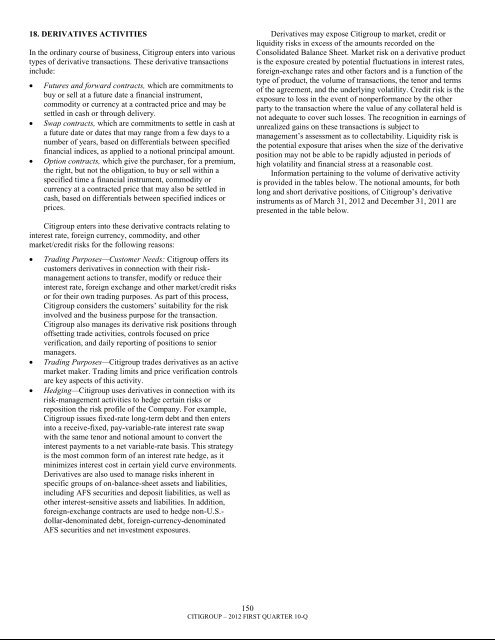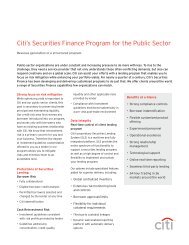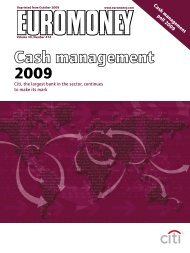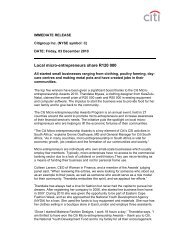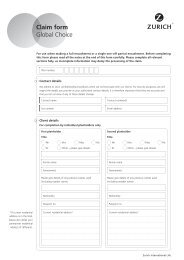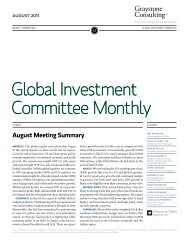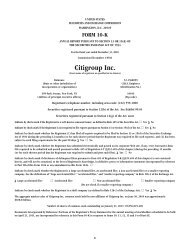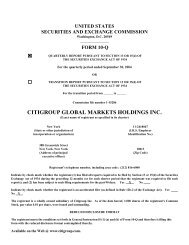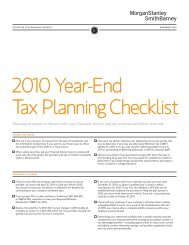7.3 billion - Citigroup
7.3 billion - Citigroup
7.3 billion - Citigroup
You also want an ePaper? Increase the reach of your titles
YUMPU automatically turns print PDFs into web optimized ePapers that Google loves.
18. DERIVATIVES ACTIVITIESIn the ordinary course of business, <strong>Citigroup</strong> enters into varioustypes of derivative transactions. These derivative transactionsinclude:Futures and forward contracts, which are commitments tobuy or sell at a future date a financial instrument,commodity or currency at a contracted price and may besettled in cash or through delivery.Swap contracts, which are commitments to settle in cash ata future date or dates that may range from a few days to anumber of years, based on differentials between specifiedfinancial indices, as applied to a notional principal amount.Option contracts, which give the purchaser, for a premium,the right, but not the obligation, to buy or sell within aspecified time a financial instrument, commodity orcurrency at a contracted price that may also be settled incash, based on differentials between specified indices orprices.Derivatives may expose <strong>Citigroup</strong> to market, credit orliquidity risks in excess of the amounts recorded on theConsolidated Balance Sheet. Market risk on a derivative productis the exposure created by potential fluctuations in interest rates,foreign-exchange rates and other factors and is a function of thetype of product, the volume of transactions, the tenor and termsof the agreement, and the underlying volatility. Credit risk is theexposure to loss in the event of nonperformance by the otherparty to the transaction where the value of any collateral held isnot adequate to cover such losses. The recognition in earnings ofunrealized gains on these transactions is subject tomanagement‘s assessment as to collectability. Liquidity risk isthe potential exposure that arises when the size of the derivativeposition may not be able to be rapidly adjusted in periods ofhigh volatility and financial stress at a reasonable cost.Information pertaining to the volume of derivative activityis provided in the tables below. The notional amounts, for bothlong and short derivative positions, of <strong>Citigroup</strong>‘s derivativeinstruments as of March 31, 2012 and December 31, 2011 arepresented in the table below.<strong>Citigroup</strong> enters into these derivative contracts relating tointerest rate, foreign currency, commodity, and othermarket/credit risks for the following reasons:Trading Purposes—Customer Needs: <strong>Citigroup</strong> offers itscustomers derivatives in connection with their riskmanagementactions to transfer, modify or reduce theirinterest rate, foreign exchange and other market/credit risksor for their own trading purposes. As part of this process,<strong>Citigroup</strong> considers the customers‘ suitability for the riskinvolved and the business purpose for the transaction.<strong>Citigroup</strong> also manages its derivative risk positions throughoffsetting trade activities, controls focused on priceverification, and daily reporting of positions to seniormanagers.Trading Purposes—<strong>Citigroup</strong> trades derivatives as an activemarket maker. Trading limits and price verification controlsare key aspects of this activity.Hedging—<strong>Citigroup</strong> uses derivatives in connection with itsrisk-management activities to hedge certain risks orreposition the risk profile of the Company. For example,<strong>Citigroup</strong> issues fixed-rate long-term debt and then entersinto a receive-fixed, pay-variable-rate interest rate swapwith the same tenor and notional amount to convert theinterest payments to a net variable-rate basis. This strategyis the most common form of an interest rate hedge, as itminimizes interest cost in certain yield curve environments.Derivatives are also used to manage risks inherent inspecific groups of on-balance-sheet assets and liabilities,including AFS securities and deposit liabilities, as well asother interest-sensitive assets and liabilities. In addition,foreign-exchange contracts are used to hedge non-U.S.-dollar-denominated debt, foreign-currency-denominatedAFS securities and net investment exposures.150CITIGROUP – 2012 FIRST QUARTER 10-Q


